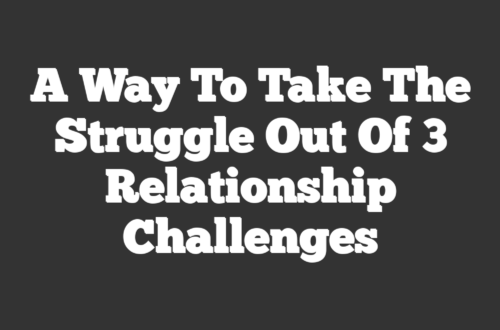
After a breakup, we all wish for a peaceful silence and a chance to heal. Yet, if your ex keeps popping up uninvited and breaking that peace, it’s hard to know what to do.
It’s a challenge many people face after a breakup, and it’s probably why you’re here, looking for answers.
In the following sections, I’ll walk you through some simple steps that will help you regain control of your situation — from setting firm boundaries to protecting your space and embracing your new chapter. Let’s dive in!
Communicate Your Boundaries Clearly
Breaking up is hard, and it becomes even more challenging when your ex refuses to accept the new reality. So, what do you do at this point?
Start by thinking about what you’re comfortable with. Do you want to stop all communication, or are you okay with talking now and then? Once you know the answer to that, sit down and have a calm conversation or send a clear message explaining your boundaries.
Here are some things to consider:
- Decide what boundaries you need (e.g., no calls, no showing up unannounced).
- Plan how to communicate these boundaries (face-to-face, message, etc.).
- Be firm and clear in your conversation or message.
Setting boundaries might feel difficult at first, but it’s crucial for healing. Your ex might not take it well the first time, but sticking to your boundaries shows that you are serious about them.
Use Firm and Clear Language
When talking to your ex about boundaries, the words you choose matter a lot. Using firm and clear language helps avoid misunderstandings and makes your intentions known. Think about what you want to say ahead of time.
Avoid phrases that leave room for interpretation, like “maybe” or “I think.” Instead, use statements like “I need“ or “I want.“
Example: Tell your ex, “I need some space to heal, and I hope you can respect that.” This sentence is direct, uses “I” statements to express your needs, and is polite yet firm.
Limit Your Interactions on Social Media
In the digital age, social media can make breakups feel longer and harder than they need to be. Seeing your ex all over your feed? That can stir up a bunch of feelings you’re trying to leave behind.
So, what can you do about it?
- Unfollow or mute: You might not want to block them right off the bat, and that’s okay. Muting or unfollowing is a great first step.
- Limit your posts: If they’re still on your friends list, you can choose what they see from your profile. Share your happy moments with everyone else, and keep them private from your ex. Social media settings are there to help you do just that.
- Take a social media break: Sometimes, the best thing to do is to step away for a bit. Taking a break from social media gives you space to breathe and focus on yourself without any distractions.
By taking these steps, you create a little bubble for yourself on social media that lets you heal at your own pace.
Block or Limit Phone and Online Communication
Imagine this: you’re trying to enjoy a quiet evening, and suddenly, your phone pings with a message from your ex. Not what you need, right? It’s time to take control of your digital space.
Consider these things to keep your phone and online communication in check:
- Block if necessary: If messages keep coming and it’s too much, most phones and apps let you block someone. This means no more calls or messages from them until you decide otherwise.
- Use features to limit contact: Many social media sites and messaging apps have features that let you limit who can message you. Look into these. They can offer a middle ground, like stopping notifications from them without a full block.
- Set Boundaries: If you’re not ready to block or limit, consider setting a clear rule for yourself about not responding to their messages, at least not right away.
Managing who can reach you and how they can reach you gives you that power back.
Document Any Persistent Behavior
When you already told them you need space, but they still keep showing up in ways they shouldn’t, it’s important to keep track of those instances. Here’s why and how:
| Why you should document: | – It helps you see the pattern if they don’t respect your requests. |
| – If things get worse, this documentation can be helpful for getting help. | |
| How to do it: | – Keep a simple record like a note on your phone or a diary where you write down dates, times, and what happened. |
| – Save screenshots of any messages or posts that cross the line. |
Taking this step is about being prepared. You hope you never need these records, but if you do, you’ll be glad you have them.
Seek Support from Friends and Family
Going through a breakup, especially when your ex won’t leave you alone, can feel really isolating. But remember, you’re not alone. Your friends and family can be a huge help during this time.
Talk to them; let them know what’s going on. Just sharing can lighten your load. Or you could also ask for what you need. Maybe it’s a night out to distract you or someone to listen. It’s okay to ask for help.
Your friends and family can be your support team, helping you through tough times with understanding and laughter.
Strengthen Your Support Network
Still on the topic of seeking support, having people you can lean on really makes all the difference when you’re going through a rough patch. Here are simple ways to make your support network stronger:
- Reach out: Sometimes, we wait for others to make the first move. Flip the script and reach out to them.
- Plan regular meet-ups: Whether it’s a weekly coffee date or a monthly meet-up, having something regular helps you stay connected.
- Share your achievements: Your support network wants to celebrate with you, not just help you through the sad times.
Engage in Self-Care and Healing Activities
Taking care of yourself should be your top priority right now. It’s not just about making yourself feel good in the moment—it’s about healing. Think of self-care as your personal recovery plan.
It can be as simple as:
- Taking a long, relaxing bath instead of a quick shower.
- Reading a book that’s been on your shelf for too long.
- Going for a walk in nature to clear your head.
The key is to do things that make you feel calm and happy. It’s about listening to what your body and mind need.
Focus on Your Own Personal Growth
After a breakup, it feels like you’re starting from scratch, and guess what? That’s not a bad thing. It’s the perfect time to focus on you — what you like, what you don’t, and what you’ve always dreamed of doing.
Maybe you’ve always wanted to be fitter or healthier. Instead of spending your evenings scrolling through memories, why not start a workout routine or try cooking healthy meals? Each step you take toward your goals makes you stronger, not just physically but emotionally, too.
Personal growth also means learning how to be comfortable being by yourself. Try doing things alone that you usually would wait to do with someone else, like watching a movie or going to a cafe. This helps you enjoy your own company and find peace in solitude.
Keep Your Private Life Private
In a world where sharing every detail of your life online is the norm, keeping things to yourself can be powerful, especially after a breakup.
Why it’s important:
- It gives you space to heal without outside opinions.
- It helps in maintaining boundaries with your ex.
How to do it:
- Think before you share: Is this something you want everyone to know?
- Choose a close circle of friends or family members to share personal updates with instead of broadcasting them publicly.
By keeping your private life just that — private — you create a safe space for yourself to rebuild and move forward.
Do Not Respond to Provocations
When your ex tries to push your buttons, it’s like they’re looking for a way back into your head. The best response? No response.
Here’s a closer look: Imagine you get a message that makes your blood boil. Your first instinct might be to send back a sharp reply. Instead, take a deep breath. Put down your phone or step away from your computer. Give yourself time to cool off.
Remember, every time you don’t respond to these provocations, you’re taking back control. You’re showing that you’re moving on, and that’s a powerful thing. By not engaging, you starve the fire of its fuel.
Over time, these provocations will likely decrease as they see they’re not getting the reaction they hoped for.
Explore Legal Protections if Necessary
There may be times when an ex’s behavior crosses a line, and your safety and peace of mind become a concern. That’s when it’s important to know what legal protections you have.
What you can do:
- Know your rights: Understanding what behavior is considered harassment in your area is a good starting point.
- Document everything: As I previously mentioned above, keep records of messages, calls, or any unwelcome interaction. This could be important later.
- Seek advice: Having a talk with a legal professional can give you clarity on your situation and what steps you can take.
Taking legal action, or even just knowing what your options are, can provide a sense of security. It’s about making sure you feel safe and respected during a time when things might feel out of control.
Prioritize Your Safety and Well-being
After exploring legal protections, remember that your number one priority is always your safety and well-being. Taking legal steps can be part of ensuring your safety, but there are everyday actions that are equally important.
Here’s what that looks like:
- If something doesn’t feel right, trust your intuition. It’s often the first signal that you need to take care of yourself.
- If you ever feel unsafe, reach out to someone you trust or a local authority. You’re not alone, and help is available.
- Beyond physical safety, your emotional well-being is vital. Continue with activities that make you feel good and keep stress at bay.
Protecting yourself isn’t just about reacting to what’s happened. It’s about creating an environment where you can thrive despite the circumstances.
Change Your Regular Routines and Patterns
Linking to both your safety and exploring legal protections, changing up your daily routines can add an extra layer of security and peace of mind. If you’re feeling concerned about any unwanted or unwelcome encounters, here are a few adjustments you might consider:
- Alter your daily routes: If you jog every morning, try a new path. If you take a specific way to work or school, mix it up sometimes.
- Visit new places: For your coffee or hangouts, explore new spots away from your usual ones.
- Timing adjustments: Changing the times you do your regular activities can also help in minimizing unwanted interactions.
Acknowledge Your Feelings Without Acting on Them
It’s natural to feel a rollercoaster of emotions after a breakup; you might feel upset, angry, or even a little lost, and that’s okay. The trick is to not let those feelings push you into saying or doing things you might regret later on.
Consider these simple steps to help you navigate through this:
| 1. Pause and name your feelings. Think, “Okay, I’m feeling really upset right now.” |
| 2. Remind yourself it’s perfectly fine to feel this way. Your feelings are valid, but they don’t have to dictate your actions. |
| 3. Decide your next step thoughtfully. Sometimes, doing nothing is the best action. Sit with your feelings, maybe talk them through with a friend, but don’t rush into any decisions. |
By handling your emotions this way, you give yourself the space to process them rather than reacting in the heat of the moment.
Practice Mindfulness and Stress Reduction Techniques
After recognizing your emotions, the next step is finding effective ways to manage stress and stay grounded. Mindfulness and other stress reduction techniques can be incredibly helpful. These practices keep you focused on the present moment, reducing anxiety and improving your overall mood.
Try starting your day with a few minutes of deep breathing, or set aside time for activities that require full attention, like cooking, which can act as meditative practices.
Seek Professional Counseling if Needed
Sometimes, despite our best efforts, we find ourselves overwhelmed or stuck. This is where professional counseling can make a huge difference. Talking to a therapist provides a safe space to explore your feelings, understand patterns, and learn healthier coping mechanisms.
If you’re contemplating whether to seek help, here’s what to consider:
- Are you feeling overwhelmed by your emotions?
- Do you find it hard to enjoy things you normally love?
- Is it difficult for you to find direction after your breakup?
If you answer “yes” to any of these, it might be time to reach out for professional support. Remember, seeking help is a sign of strength and an important investment in your well-being.
Celebrate Your Independence and Strength
Now that you’re navigating life post-breakup, there’s something incredibly empowering about recognizing your own independence and strength. It’s a chance to celebrate all that you are and all that you’ve overcome. This doesn’t have to involve big gestures, though. Small, daily acknowledgments of your growth can be profoundly uplifting.
Take yourself out on a date. Whether it’s to your favorite café or a quiet spot in the park, cherish your own company. You could also set personal goals, from career ambitions to fitness targets. Focus on what you want to achieve for yourself.
Understand It’s Okay to Say No
After a breakup, especially if your ex is still reaching out, you might feel pressured to respond or engage out of habit or guilt. But remember, it’s okay to say “no.” Setting boundaries is not just about physical space — it’s also about your emotional and mental well-being.
Here’s what saying no can look like:
- Declining invites to events where your ex will be, without feeling guilty.
- Choosing not to engage in conversations or situations that make you uncomfortable.
- Prioritizing your own needs over pleasing others.
Reset Boundaries After Any Violation
Linking back to the idea of saying “no,” sometimes, despite everything you do, boundaries get crossed. When that happens, think of it as your cue to redraw those lines — maybe a bit further back this time.
If your ex keeps reaching out even when you’ve clearly asked for space, it’s time to make those boundaries even clearer. It’s your way of saying, “I really meant it about needing space.”
How to make it happen:
- Say it again, calmly. “I need to remind you that I asked for no contact. Please respect that.”
- Make your online world more private. Change settings or block them if you need to.
- Lean on others if things don’t improve. Sometimes, telling a friend or getting advice is the next step.
Keep Consistent in Your Responses
In this context, being consistent means following your own rules — every single day. If you’ve decided not to answer texts from your ex, keep doing that every time they text. This shows you’re serious about your boundaries, and it sends a clear message: “I’m moving on.”
Why is this important?
It clears up any confusion. Changing your mind a lot can make things messy.
It makes you stronger. Each time you stick to your plan, you’re teaching yourself a valuable lesson in resilience.
It helps you heal. Focusing on being consistent keeps your mind on what’s good for you, not what’s in the past.
Staying consistent in how you respond — whether that’s saying “no” more often or reinforcing your boundaries — is all about respecting yourself and protecting your peace.
Don’t Be Afraid to Start Fresh Somewhere New
Have you ever thought about changing things up completely? Maybe moving to a new city or trying a totally different career path? These big changes can be scary, but they can also be the start of something amazing.
Starting fresh somewhere new gives you the chance to be the person you’ve always wanted to be without anything holding you back.
Here’s what starting fresh could look like:
- Exploring new places that you’ve always wanted to visit.
- Meeting new people who don’t know your past and seeing yourself through their eyes.
- Trying out new activities or hobbies that you never had the time or courage to before.
Remember This Period Is a Transition to Better Days
It’s easy to get caught up in the here and now, especially when things seem tough. But remember, this period in your life is just a transition, a bridge to better, brighter days ahead. The rain doesn’t last forever, and soon enough, you’ll find yourself moving into a phase full of new possibilities and joy.
Consider this: Every experience teaches us something valuable about ourselves and what we want from life. Time heals; with each passing day, the weight on your shoulders will feel a bit lighter.
This challenging time is not the end of your story; it's just setting the scene for the next, more beautiful chapter.
Frequently Asked Questions
How can I tell if my ex’s behavior is just annoying or actually harmful?
If your ex’s behavior makes you feel unsafe, anxious, or threatened, it might have crossed from being simply annoying to potentially harmful. Trust your instincts. If their actions affect your daily life or mental peace, it’s serious.
What if we share mutual friends or work together?
In situations where you have to interact:
– Try to keep conversations professional and limited to the context (work, group events).
– Let mutual friends know you prefer not to discuss or hear updates about your ex.
– Consider setting boundaries within these shared spaces, like not attending the same small gatherings.
Is it necessary to block my ex on social media?
It depends on your situation. If seeing their updates is painful or if they use social media to contact you despite your request for space, blocking or limiting their access might be beneficial for your healing process.
What should I do if I start missing my ex?
Feeling nostalgic or missing your ex occasionally is normal. When this happens, remind yourself why the relationship ended and focus on the positive aspects of your single life. Engage in activities that bring you joy and fulfillment.
Final Thoughts
We’ve covered quite a bit about handling an ex that just won’t back off, haven’t we? My hope is that you find these suggestions not just helpful but also empowering.
Creating boundaries and seeking peace isn’t selfish; it’s necessary for your well-being. Believe it or not, facing challenges like this head-on helps you grow in ways you might not expect.
So, as we wrap up, keep this in mind: every challenge, including this one, is a chance to learn more about yourself and what you’re truly capable of. You’re building a stronger you, ready for all the great things yet to come.




